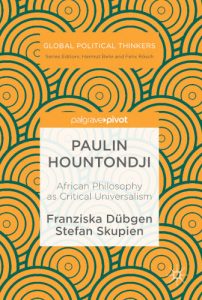On Paulin Hountondji’s Universalist philosophy—Sanya Osha reviews Paulin Hountondji: African Philosophy as Critical Humanism, by Franziska Dubgen and Stefan Skupien.

Paulin Hountondji: African Philosophy as Critical Humanism
Franziska Dubgen and Stefan Skupien
Palgrave Macmillan, 2019
During the extraordinarily intense debates on the future trajectory of modern African philosophy at the dawn of African independence, Paulin J Hountondji, along with the likes of Kwasi Wiredu of Ghana, Henry Odera Oruka of Kenya and Peter O Bodunrin of Nigeria—a group known as the Universalists, all of whose members were influenced by their elaborate Western educations—played a pivotal role. There hasn’t been such verve, colour and imagination in the field since those vital foundational debates.
A citizen of Benin (then known as Dahomey), Hountondji was born in Treichville, Côte d’Ivoire in 1942. After his secondary school education, he travelled to France, where he studied philosophy at the École normale supérieure under the supervision of world-renowned professors such as Jacques Derrida, Louis Althusser, Paul Ricoeur and Georges Canguilhem. During his decade of postgraduate studies, he familiarised himself with the school of deconstruction, post-structuralist thought, epistemology and phenomenology, whose founder, Edmund Husserl, is the subject of his doctoral dissertation. Hountondji initially wanted to continue his studies in phenomenology but decided to venture into the then-contested terrain of modern African thought, with the boost of a Unesco-funded fellowship to conduct research on the work of Anton Wilhelm Amo, the Ghanaian philosopher who lectured at a number of German universities in the eighteenth century. Amo undoubtedly forced Hountondji to reconsider his philosophical path, and steered him permanently to research the discipline from an unambiguously African perspective, even while consistently remaining true to the essential spirit of the philosophical enterprise.
Hountondji conceives of philosophy as more or less a science. His mission has been to elevate the discipline above the fuzziness—and also the presumed lack of disciplinary rigour—he believed tainted the work of those who were termed Africa’s philosopher-kings, notably Kwame Nkrumah, Leopold Sedar Senghor and Julius Nyerere. These men were all embroiled in the hurly-burly of decolonisation that gripped Africa during the nineteen-forties, and soon after independence in the nineteen-sixties they embarked on the arduous task of nation-building as the heads of state of their respective countries. Hountondji sought to return philosophy to a purer, less frenetic and less politicised mode, which entailed stricter benchmarks of professionalisation.
The new book on his work by Franziska Dubgen and Stefan Skupien, Paulin Hountondji: African Philosophy as Critical Universalism, has many strengths—the most obvious being the coherent classification of Hountondji’s diverse writings into easily identifiable conceptual categories. Here, ethnophilosophy, a discourse within the field that Hountondji all but demolished, inevitably dominates, for it provided him with a decisive entry into the world of established philosophical luminaries. Ethnophilosophy was pioneered by a Belgian cleric, Placide Frans Tempels (1906–1977) and a Rwandan priest, Alexis Kagame (1902–1981). In his famous book Bantu Philosophy (1945), Tempels attempted to identify, to quote from Dubgen and Skupien, ‘a coherent philosophical system among Bantu-speaking Africans, based on a distinct ontology which conceives of being as dynamic. This, according to Tempels, sets it apart from a Western ontology, which considers being as static’. Originally, Tempels had sought to free the African subject from the racist gaze of Eurocentric anthropology, but his exertions had, in Hountonji’s view, ended up creating another mythology of the African. He faulted ethnophilosophy for harbouring the myth of unanimity which denied Africans ontological mobility, agency and alterity. This myth implies an essentialising homogeneity that does much to deny Africa’s incredible diversity. In addition, ideologies of authenticity are often narrow or knee-jerk instances of nativism that are instrumentalised solely for the benefit of parochial political interests.
Kagame, for his part, like his European co-author, had been guilty of formulating yet another mythology by employing Aristotelian ontological categories in relation to the African subject. Hountondji believed, per Dubgen and Skupien, that ‘the ontological order created by [Tempels and Kagame] diminishes the Africans, rather than affirming them as equals, and, in the end, justifies the colonial project, as well as the missionary project’. He found suspect the claim by ethnophilosophers that they were presenting African systems of thought when in fact they were offering their own fictions of Africa. In addition, he accused ethnophilosophy of imposing a ‘double standard: whereas Western philosophy is conscious and well-reasoned, African philosophy is unconscious and implicit’. More damagingly, Hountondji argued that the claims of ethnophilosophy can neither be validated or disproved using acceptable academic criteria.
Hountondji also had unsparing words for the work of Negritudists such as Léopold Senghor and Aimé Césaire. His antagonism towards Negritude stemmed from his anti-essentialist outlook, which he believed the movement was unable to entertain. Neither is the conceptual thought of Nkrumah spared. Hountondji’s overriding aim was to return philosophy to standards that were unimpeachable. In this regard, the technology of writing is a vital requirement for philosophy, while orality is frowned upon. Even Derrida’s concept of logocentrism does not count for much here, as, according to Hountondji, philosophy is written by identifiable individual philosophers as opposed to being derived from the largely anonymous offerings of folk wisdom or precolonial collective thought. This stance elicited a great deal of criticism, most notably from scholars such as Olabiyi Yai and Oyekan Owomoyela. During that era, Marxist thought was the official doctrine in Benin, which had rejected capitalism after Major Mathieu Kérékou seized power in a military putsch in 1972. Hountondji, in the view of his critics, did not seem entirely convinced of the desirability of Marxism–Leninism and was thus vilified. More specifically, Hountondji was charged with elitism: the argument went that his thought had very little relevance to the realities of Africans. But a closer inspection of Hountondji’s career demonstrates that he always wanted to make his thought relevant and engaging. From the nineteen-sixties onwards, his central preoccupation has been to discover an avenue through which an Africa-centred philosophy could be pursued as a valid and globally accepted discipline.
Hountondji’s first teaching position in Zaire (now the Democratic Republic of Congo) gave him his initial taste of a neocolonial malaise, whereby public discourse and social engineering could be effectively muddled and mangled by convenient and readily available pseudo-ideologies of authenticity, as when Mobutu Sese Seko, the dogged dictator, reigned. Later, when he returned to Benin, Hountondji consistently warned against the dangers of philosophies of authenticity, which tended to stifle the possibilities of free thought, unrestrained public discourse, constructive dissent and social innovation. His particular interventions during the national efforts of returning Benin to democratic rule in the nineteen-nineties are noteworthy. Hountondji sought to open up the public realm for the active participation of citizens, which, he pointed out, was of the utmost necessity for the wellbeing of the polity. He also warned against the ills of the over-centralisation of power. Perhaps this was a means of debunking his critics’ claims that he was elitist
Another way Hountondji can be considered to have countered the charges of elitism is through the formulation of the concept of ‘endogenous knowledge’, which came about through a students’ seminar he organised in 1987. As usual, Hountondji had sought to provide the much-devalued and derided notion of indigenous knowledge a scientific rationale. Although Hountondji did not publish a paper from this collective venture, the research efforts culminated in a large volume he edited for the Council for the Development of Social Science Research in Africa (CODESRIA), released in a French edition in 1994. The papers in the volume addressed traditional medicine, indigenous pharmacology and archaeology. Arguably, the entire approach might be regarded as a more well-thought-out way of addressing the lapses of ethnophilosophy and infusing the global discipline of philosophy itself with greater cultural inclusivity. In theoretical terms, this late effort may also be considered Hountondji’s last major contribution to the development of contemporary African philosophy.
Apart from his highly influential book, African Philosophy: Myth and Reality (1976), which included his compelling insights on ethnophilosophy, Nkrumah’s philosophy of consciencism, and Amo’s philosophical dilemmas and metaphilosophical questions—and which was named one of Africa’s 100 Best Books of the 20th Century in 2000—Hountondji also published his semi-autobiographical work, The Struggle for Meaning: Reflections on Philosophy, Culture and Democracy in Africa (2002), which chronicles his exciting intellectual journey. In parts much less academic than his earlier book, this work is unusual in African philosophy for marrying memoir and sometimes random philosophical musings in a somewhat irreverent manner. Here, he is able to respond to his numerous critics without always suppressing what is revealed to be his considerable self regard. Oftentimes, he situates himself in an almost messianic crusade to save African philosophy from an ever-advancing demise, or from the onslaughts of pretenders who never have its best interests at heart.
In Benin, between 1990 and 1993, Hountondji served as both Minister for Education and Minister for Culture and Communication during the new democratic dispensation, which he had helped birth. During this stint, Hountondji had planned to implement radical reforms in the education sector and also establish philosophy in more central role in driving national development. When he sensed he was only being kept in government to furnish it with a veneer of intellectual legitimacy, he promptly returned to academia, where he has continued to publish research papers and spread the gospel of African philosophy around the globe. He has lived a busy, itinerant life, travelling to different parts of the world for research fellowships and attending important philosophy meetings and conferences. It isn’t a surprise that he is one of the most instantly recognisable names in the discipline.
Dubgen and Skupien make strong arguments for receiving Hountondji as a global thinker. His struggles to establish an African philosophical tradition of world-class standards are indeed legendary. He refutes the condescension of racism while attempting to propel African philosophical practices towards universal goals. By reflecting on Kwasi Wiredu’s formulation of conceptual decolonisation, he also supports efforts at discovering common values, concepts and orientations in different African languages, in order to arrive at universal human precepts. Thus, a powerful current of transculturality becomes evident in his work. One of the more obvious ways to acknowledge the notion of transculturality is to examine how the concept of human rights became enshrined in various cultures long before its general acceptance as a global declaration. Human rights, Hountondji avers, were already in existence as rudimentary precepts, but it took the disasters of the World Wars to formalise, institutionalise and universalise them. Undoubtedly, interventions such as this lend credence to his standing as a global intellectual.
For their book, Dubgen and Skupien were granted an extensive interview with Hountondji, in which he dwells on his role in the widespread democratic agitations that dominated Benin in the early nineteen-nineties, and clarifies his positions on a range of issues, beginning with his famous critique of ethnophilosophy. The authors ask if ‘endogenous knowledge’ isn’t in fact a ‘rehabilitation’ of ethnophilosophy, to which Hountondji replies: ‘Not really. Rather another aspect of the same struggle against marginalisation: a critique of ethno-science as a necessary complement to the critique of ethno-philosophy’. He goes on to reaffirm that ‘philosophy is first and foremost an individual exercise and by no means a collective system of thought’. For the development of a viable philosophical practice in Africa, Hountondji mentions logic, epistemology, philosophy of science, history and sociology of science, and the anthropology of knowledge in orature as the key branches of the discipline, and also includes the history of Western philosophy.
Through quite remarkable scholarship, Dubgen and Skupien manage to piece together engraved patterns of logic, coherence and conceptual intrigue in Hountondji’s eventful life and career, which have been marked by meteoric peaks and bouts of furious activity. The book’s other major strength is that it provides a sequential context that is not always evident in the pace and texture of Hountondji’s often inspirational and faintly apocalyptic writings. As they write in their introduction, ‘his rich work invites us to … contribute to a shared horizon of understanding the globally entangled world’. In that may be found perhaps the strongest argument of all for marking Hountondji’s quest to realise African philosophy at the heart of the world’s epistemology a success.
- Sanya Osha has published novels, poetry and works of philosophy. His work include the novels, Naked Light and the Blind Eye (2010) and An Underground Colony of Summer Bees (2012), which is about a drug subculture set in Durban, South Africa. He has also published a book of poetry, A Troubadour’s Thread (2013). Postethnophilosophy, his work of philosophy, received honorable mention in 2013 from the New York Association of African Studies (NYASA). He lives and works in Pretoria, South Africa.






This is a very revealing review. Hountondji’s place in African philosophy is assured.
By the way, I have been looking for your book Postethnophilosophy. Intriguing title! I think we should correspond.